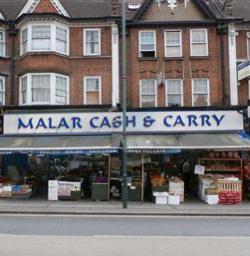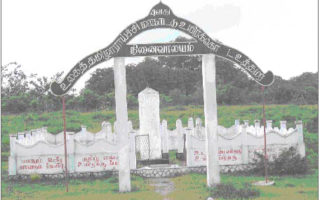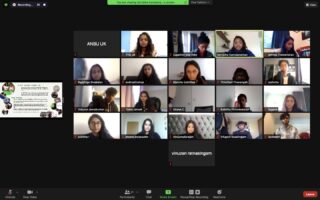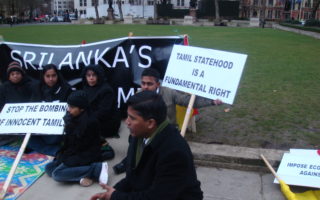Silencing our voices by Indu
November is a time of remembrance. It is a time that we, Eelam Tamils, come together to reflect on our history, our identity and our resistance. It is also a time we remember the sacrifices that our heroes made for the freedom of Tamil Eelam and to pledge to them that we will continue our journey towards Tamil Eelam.

Our sisters and brothers who sacrificed their lives to enable us to have better ones, must never be forgotten. Every year, in November, on our National Heroes Day, we gather as a community to remember the lives that fell to liberate the Tamil nation from the Sri Lankan state.
It is our basic human right to be able to have this time to remember them.
Due to the current global pandemic, we were unable to come together physically, but we used online platforms to pay our respects.
One such way to honour the fallen is to display the national flag of Tamil Eelam. This is done without fail every year. From individual houses, to Tamil schools, to University Tamil societies and to Tamil shops, they all choose to display with pride our national flag. This has not been an issue in the vast majority of the cases. However, this year, a shop in Wembley, London, Malar Cash and Carry, was paid a visit by the Metropolitan Police and were told to remove both our national flag and a photo of our national leader. Despite the staff contesting the flag was not banned, the police officers threatened to take action. This had occurred as a result of a complaint that was made.
In the homeland, the Sri Lankan state had intensified its clampdown on Maaveerar Naal commemorations this year by issuing court orders and had the military block the Thuyilum Illams, which were already destroyed by the Sri Lankan forces. However, our nation still paid their tributes in private at home. Thuyilum Illams were created for Tamils to gather to remember their dead. The Sri Lankan forces ruthlessly destroyed these war cemeteries. Remembrance is resistance and our nation continues to resist the ongoing Tamil genocide.
Even whilst they were stripped off their right to collective commemoration.
Displaying our flag gives us a sense of pride. The Tamil Eelam flag signifies our identity and who we are. It also signifies all the loss we have had and continue to have because of the Sri Lankan state. A flag represents not only the country but also our beliefs, values and history – a part of our history is the lives that we are now remembering. The colours in our flag are all part of our movement towards independence. The yellow indicates freedom, the red indicates social justice, the black represents the pain/suffering we continue to go through to gain this independence we seek and the white represents purity and honesty. Our flag represents our country, our beliefs and our values but also the struggle that we have gone through and the lives we have lost. It is the history of our country. It is a representation of our inalienable right to self-determination.
Contrary to our Tamil Eelam flag, the Sri Lankan flag symbolises the chauvinism deeply rooted in the state, the main reason why we find it necessary to be able to self-govern. Their ownership of the country is clearly shown with the lion with the four bo leaves signifying Buddhism and the large red part signifying Sinhalese people with small orange and green sections for Tamil and Muslims. This symbolises the Sinhalisation of Tamil areas, by for example building of Buddhist shrines over Hindu temples. Essentially, the Sri Lankan flag represents the injustice towards our nation.
As a nation, we also display photos of our national leader, Honourable Velupillai Prabhakaran. He founded the LTTE to fight against the injustice towards Tamils and gain an independent and sovereign state of Tamil Eelam, as mandated by the Eelam Tamil nation in the Vaddukoddai resolution of 1976. Therefore it is impossible not to also celebrate our national leader during this time.
We are being stripped of our basic right to remember and commemorate the lives lost in our homeland. We are being stripped of our basic right to remember in the UK due to the officers being ill informed. It is the duty of the Metropolitan Police to ensure they understand the grievances of the British Eelam Tamils residing in the UK and to provide us with the moral support that is needed during the month of November. Britain also has a moral obligation, as after all, it was the British colonisers who amalgamated the Sinhalese and Tamils in the island and handed over administrative power to the Sinhala south, largely ignoring the rights of the Tamil people.



